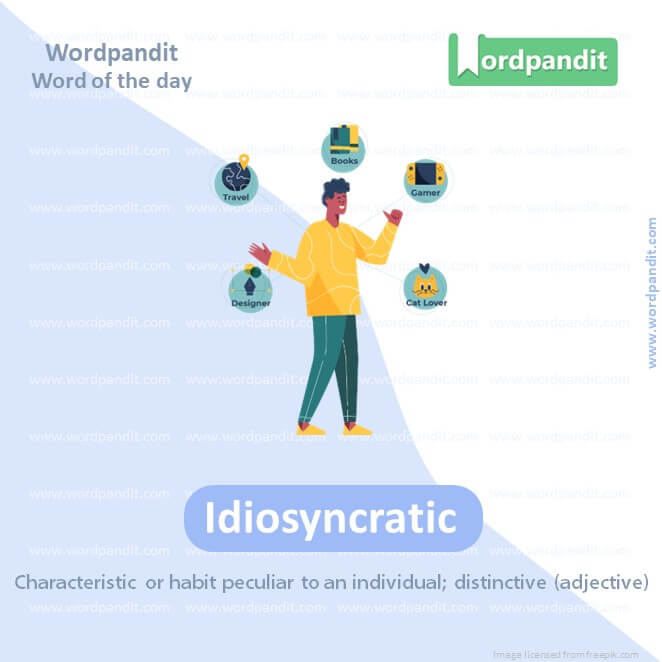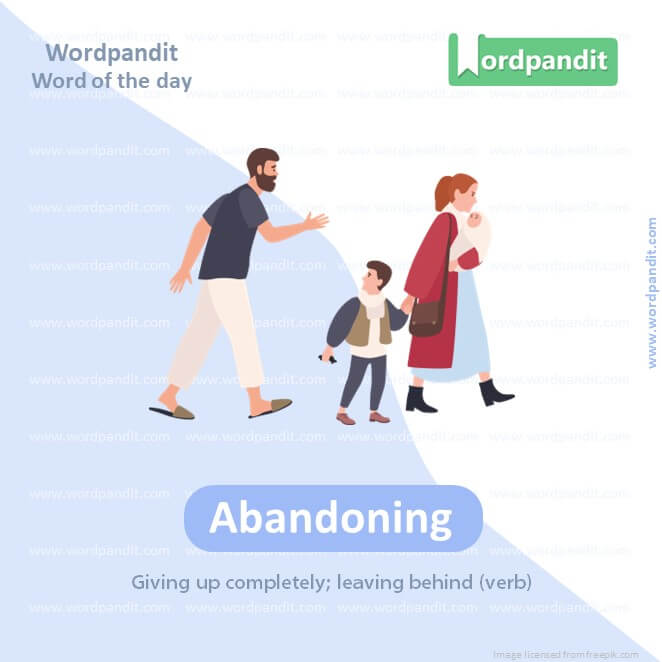Daily Vocabulary Words: List of Daily Used Words
Hi there. Welcome to this special section @ Wordpandit.
Our endeavour here is straightforward: highlighting important daily vocabulary words, you would encounter in The Hindu. This is your repository of commonly used words; essentially, we are posting a list of daily used words. Hence, this has significant practical application as it teaches you words that are commonly used in a leading publication such as The Hindu.
Visit the website daily to learn words from The Hindu.

WORD-1: Idiosyncratic
CONTEXT: The import bill was expected to go beyond the relatively tepid trends in recent months, spurred by anticipation of festive demand for items such as jewellery and high-end electronics. But this surge, and the deficit tally, was beyond expectations, with economists describing it as ‘a rude shock’ thanks to ‘idiosyncratic’ effects.
SOURCE: The Hindu
EXPLANATORY PARAGRAPH: Imagine everyone has a special way of doing things, like how you might tie your shoes in a funny way that’s different from your friends. That special way is called ‘idiosyncratic’. It means something unique or different about a person or thing, like a habit or a way of thinking that’s just theirs.
MEANING: Characteristic or habit peculiar to an individual; distinctive (adjective).
PRONUNCIATION: ih-dee-oh-sin-KRAT-ik
SYNONYMS: Unique, Distinctive, Individual, Peculiar, Quirky
USAGE EXAMPLE:
1. She has an idiosyncratic way of laughing that’s easily recognizable.
2. His idiosyncratic approach to problem-solving often leads to innovative solutions.
3. The artist’s idiosyncratic style sets her work apart from others.
4. The software has some idiosyncratic features that may confuse new users.
WORD-2: Compulsions
CONTEXT: Driven by anger and internal political compulsions, Israel’s leaders have chosen to ignore the message that Maria Montessori had given to the world.
SOURCE: The Hindu
EXPLANATORY PARAGRAPH: Think of a time when you really, really wanted to do something, like eating a cookie before dinner. That really strong feeling to do something is called a ‘compulsion’. It’s like when you feel you must do something, even if you know you shouldn’t.
MEANING: An irresistible urge to behave in a certain way, especially against one’s conscious wishes (noun).
PRONUNCIATION: kuhm-PUL-shuhns
SYNONYMS: Urge, Impulse, Need, Obsession, Drive
USAGE EXAMPLE:
1. She felt a compulsion to check her phone every few minutes.
2. The compulsion to eat sweets was too strong to resist.
3. He has a compulsion for perfection in his work.
4. Sometimes, people with compulsions need help to control them.

WORD-3: Rehabilitate
CONTEXT: UNICEF has discussed how difficult it is to rehabilitate children who have experienced or participated in violence, into civic life.
SOURCE: The Hindu
EXPLANATORY PARAGRAPH: If you get hurt and can’t walk properly, you might go to a special doctor who helps you walk again. This process is called ‘rehabilitate’. It means helping someone or something get better and return to normal after they’ve been hurt or had problems.
MEANING: To restore to a condition of good health or to a normal life (verb).
PRONUNCIATION: ree-huh-BIL-i-tayt
SYNONYMS: Restore, Recover, Heal, Mend, Improve
USAGE EXAMPLE:
1. The hospital program is designed to rehabilitate injured athletes.
2. Efforts are underway to rehabilitate the old industrial site.
3. Wildlife experts rehabilitated the injured bird before releasing it back into the wild.
4. After his surgery, he underwent a long process to rehabilitate his leg.

WORD-4: Abandoning
CONTEXT: The majority wiped out even this timid advance and went into wholesale retreat by abandoning the field and leaving same-sex couples to the mercy of the government and the legislature, whose policy on this matter is clear.
SOURCE: The Hindu
EXPLANATORY PARAGRAPH: Think about leaving your favorite toy at the park and not going back to get it. That’s like ‘abandoning’. It means to leave something or someone behind, especially when they need you or you should take care of them.
MEANING: Giving up completely; leaving behind (verb).
PRONUNCIATION: uh-BAN-duh-ning
SYNONYMS: Forsaking, Deserting, Quitting, Discarding, Relinquishing
USAGE EXAMPLE:
1. He thought about abandoning the old car in the garage.
2. After the storm, many houses were left abandoned.
3. She considered abandoning her studies to travel.
4. Abandoning a pet is considered cruel and irresponsible.

WORD-5: Paradigm
CONTEXT: The process of policymaking must begin with listening to those who have not been given much value in the present economic paradigm.
SOURCE: The Hindu
EXPLANATORY PARAGRAPH: Imagine if everyone in school started using pencils instead of pens to write. This new way of doing things is called a ‘paradigm’. It’s like a pattern or an example of how something is usually done or how people think about something.
MEANING: A typical example or pattern of something; a model (noun).
PRONUNCIATION: PAR-uh-dym
SYNONYMS: Model, Example, Standard, Pattern, Prototype
USAGE EXAMPLE:
1. The company is a paradigm of success in the industry.
2. His approach challenges the traditional paradigm of teaching.
3. The new law serves as a paradigm shift in how we think about the environment.
4. Scientists often use paradigms to explain complex theories.
WORD-6: Operationalise
CONTEXT: The conditions are prime for the two countries to operationalise their shared vision for the Indo-Pacific.
SOURCE: The Hindu
EXPLANATORY PARAGRAPH: Imagine you have a toy car, but it doesn’t move. When you figure out how to make it move, you ‘operationalise’ it. It means making something work or putting an idea into action so that it really does something.
MEANING: To put into operation or use; make functional or practical (verb).
PRONUNCIATION: op-uh-RAY-shuh-nuh-lyze
SYNONYMS: Implement, Execute, Activate, Enact, Apply
USAGE EXAMPLE:
1. The company needs to operationalise its new strategy to see results.
2. After developing the theory, the next step is to operationalise it in a real-world setting.
3. The government is finding it difficult to operationalise the proposed changes in law.
4. Teachers are trained to operationalise educational concepts in the classroom.

WORD-7: Reaffirmed
CONTEXT: Transportation Secretary Jaime Bautista reaffirmed this earlier this month when he noted that the Philippine government is willing to tap both countries for development assistance.
SOURCE: The Hindu
EXPLANATORY PARAGRAPH: If you tell your friend you’ll help them, and then you tell them again to make sure they know you’re serious, that’s ‘reaffirming’. It’s like saying something again to show that you really mean it or believe in it.
MEANING: To state again strongly; to confirm or repeat (verb).
PRONUNCIATION: ree-uh-FERM
SYNONYMS: Confirm, Reiterate, Reinforce, Assert, Validate
USAGE EXAMPLE:
1. The teacher reaffirmed the importance of doing homework on time.
2. The meeting was used to reaffirm our commitment to the project.
3. He reaffirmed his promise to help whenever needed.
4. The policy was reaffirmed by the new government.
WORD-8: Entitlements
CONTEXT: The minority endorsed recognition of a bouquet of entitlements but failed to carry the matter further by spelling out rights and giving focused directions.
SOURCE: The Hindu
EXPLANATORY PARAGRAPH: Think of getting a sticker for being good in class. You get it because you did something well. ‘Entitlements’ are things that you have a right to get, like the sticker, because of something you did or because of who you are.
MEANING: Rights to benefits or privileges (noun).
PRONUNCIATION: en-TYT-l-muhnts
SYNONYMS: Rights, Privileges, Benefits, Claims, Perquisites
USAGE EXAMPLE:
1. The law grants certain entitlements to veterans.
2. Many people rely on government entitlements like social security.
3. Understanding your entitlements at work is important.
4. The debate continues over the cost of healthcare entitlements.
WORD-9: Unanimous
CONTEXT: While the SC Bench in Supriyo was unanimous, sadly, in holding that there was no fundamental right to marry, there was a difference in the majority and minority opinions when it came to the question of civil unions.
SOURCE: The Hindu
EXPLANATORY PARAGRAPH: When you and your friends all agree to play the same game, that’s being ‘unanimous’. It means everyone agrees and has the same opinion about something.
MEANING: Fully in agreement; showing complete agreement (adjective).
PRONUNCIATION: yoo-NAN-ih-muhs
SYNONYMS: United, Consensual, Agreed, Harmonious, Concurring
USAGE EXAMPLE:
1. The decision to go to the park was unanimous.
2. The jury reached a unanimous verdict.
3. It was a unanimous vote in favor of the new policy.
4. The team was unanimous in their support for the coach.
WORD-10: Mortgage
CONTEXT: The sub-collector, make a gift or exchange for public purposes or obtain a loan by securing a mortgage in a public financial institution for agriculture.
SOURCE: The Hindu
EXPLANATORY PARAGRAPH: Imagine your parents want to buy a house, but they don’t have all the money right now. They can borrow money from a bank and promise to pay it back later. This borrowed money for buying a house is called a ‘mortgage’.
MEANING: A legal agreement by which a bank lends money in exchange for taking title of the debtor’s property, with the condition that the conveyance of title becomes void upon the payment of the debt (noun).
PRONUNCIATION: MOR-gij
SYNONYMS: Loan, Lien, Debt, Advance, Credit
USAGE EXAMPLE:
1. They took out a mortgage to buy their first home.
2. Paying off a mortgage is a long-term commitment.
3. The bank offers several types of mortgages to its customers.
4. She is shopping around for the best mortgage rates.
vocabulary classes
In today’s multicultural world, knowledge is your greatest asset. And in this pool of knowledge, one arena that often goes underestimated is ‘vocabulary classes’. Most people limit the concept of vocabulary to knowing a few fancy words. However, it is much more; it’s about giving you the key to express your thoughts, feelings, and ideas more effectively.
Firstly, let’s examine why vocabulary classes are essential. When you take vocabulary classes, you’re essentially equipping your linguistic arsenal with words that allow you to articulate your messages more accurately. A well-developed vocabulary means not only knowing a multitude of words but also being able to utilize them in the appropriate context, thus enhancing your communication skills.
Now, how should we approach learning in vocabulary classes? The process of expanding your vocabulary should not be stressful. The best approach is to incorporate playfulness, curiosity, and active engagement. Incorporate reading, writing, listening, and speaking activities that are sourced from various contexts – books, movies, podcasts, discussions, and debates.
One important principle to remember when taking vocabulary classes is repetition. Repeated use of new words in different contexts will reinforce their meaning and solidify them in your memory, reducing the chance for forgetfulness.
Moreover, let’s not forget the role of technology in vocabulary classes. There’s a variety of applications and online platforms that have revolutionized the way we learn new words. They offer interactive classes, quizzes, games, and other engaging resources that make the learning process fun and effective.
In summary, vocabulary classes serve as a potent tool for enhancing your communication skills, and expressing your ideas confidently and clearly. Whether you are a business professional, student or just looking to improve your language abilities, vocabulary classes are amongst the best investments you could make. You not only learn new words but get the confidence and tools to wield them effectively.










